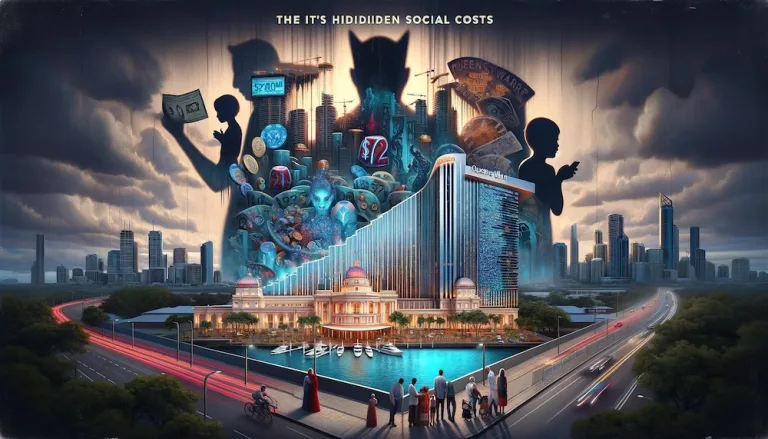In a revealing development that has sent shockwaves through the community, a concealed report has surfaced, shedding light on the social repercussions associated with Brisbane’s burgeoning casino scene. The focus of this exposé is the $3.6 billion Queen’s Wharf development, a project that, while promising economic prosperity, has been flagged for its potential to aggravate problem gambling issues within the city. This article not only uncovers the findings of this critical study but also traces the historical roots of gambling in Brisbane, setting the stage for a comprehensive understanding of the current predicament.
Gambling in Brisbane: From Humble Beginnings to Casino Giant
The history of gambling in Brisbane, much like the rest of Australia, is a tale of evolution from small-scale betting activities to the establishment of grand casinos that dominate the skyline. Early settlers participated in informal gambling as a form of recreation, but it wasn’t until the late 20th century that the government began to regulate and institutionalize gambling, paving the way for the construction of major casinos. The Treasury Casino, Brisbane’s first, marked a significant turn in the city’s gambling landscape, introducing a centralized venue for betting activities. This move was mirrored by the development of Queen’s Wharf, envisioned as a world-class entertainment precinct that would further cement Brisbane’s position in the global gambling market.
The Unveiled Report: A $700 Million Concern
The focus of the controversy, however, is a comprehensive study into the impacts of the Queen’s Wharf development, particularly its new casino component. Commissioned by the Queensland government at a cost of over $2 million to taxpayers, the study’s findings were astonishing yet were never made public until now, thanks to the Brisbane Times’ efforts under the Right to Information Act.
Researchers from the Queensland University of Technology (QUT) who conducted the study found that the Treasury Casino already derived 20-30% of its revenue from local problem gamblers. This issue was projected to exacerbate with the introduction of Queen’s Wharf, potentially creating an additional 300 problem gamblers in Brisbane and adding $18.4 million to the already staggering $700.5 million in annual social costs associated with gambling.
Despite these alarming projections, the Queensland government shelved the long-term study intended to monitor the casino’s impact on community well-being, leaving critical questions unanswered and necessary actions untaken.
The Ripple Effects: Beyond Financial Loss
The implications of such a significant concentration of gambling facilities in Brisbane extend beyond financial metrics. The social fabric of the city is at risk, with vulnerable groups, particularly Asian-born residents and young adults aged 25-34, identified as targets for the casino’s marketing strategies despite high rates of problem gambling within these demographics. This targeted approach not only threatens individual well-being but also places undue strain on community resources and support systems designed to combat gambling addiction.
Moving Forward: A Call for Transparency and Responsibility
As Brisbane stands on the cusp of a new era in gambling with the slated opening of Queen’s Wharf in August 2024, the need for transparency and responsible governance has never been more critical. The concealed report serves as a stark reminder of the complex interplay between economic development and social welfare, urging stakeholders to reconsider the true cost of gambling expansion in urban environments.
In light of these revelations, the community and policymakers alike must engage in a candid discussion about the future of gambling in Brisbane, weighing the lure of economic benefits against the undeniable social ramifications. Only through informed decision-making and proactive harm minimization strategies can Brisbane navigate the challenges posed by its growing gambling industry, ensuring a sustainable and inclusive future for all residents.

Garry Sputnim is a seasoned journalist and storyteller with over a decade of experience in the trenches of global news. With a keen eye for uncovering stories that resonate, Alex has reported from over 30 countries, bringing light to untold narratives and the human faces behind the headlines. Specializing in investigative journalism, Garry has a knack for technology and social justice issues, weaving compelling narratives that bridge tech and humanity. Outside the newsroom, Garry is an avid rock climber and podcast host, exploring stories of resilience and innovation.


